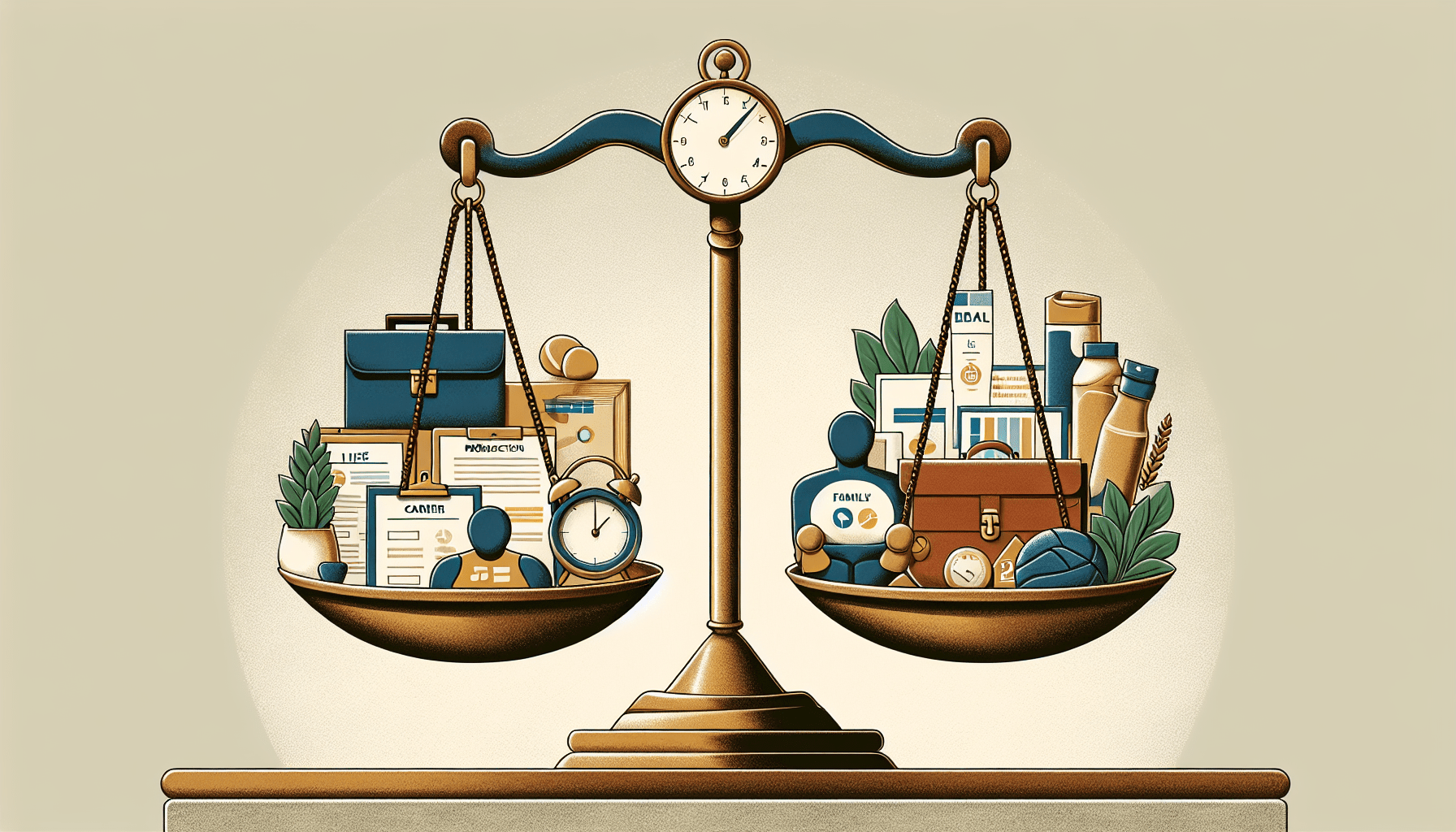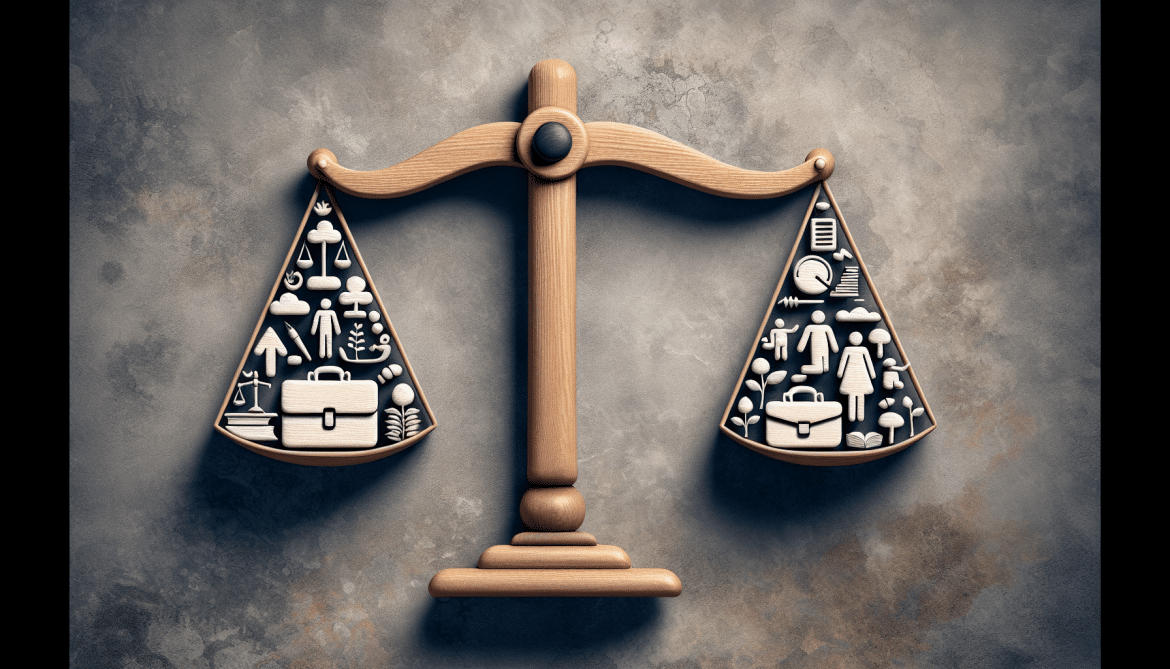Achieving career growth and maintaining a healthy work-life balance can sometimes feel like an impossible juggling act. We all strive for professional success, but it should never come at the expense of our personal lives and overall well-being. In this article, we will explore practical strategies and insightful tips to help you navigate the delicate balance between advancing your career and enjoying a fulfilling personal life. Whether you're a seasoned professional or just starting out, this article will provide valuable guidance to help you thrive in both aspects of your life.
Setting Clear Priorities
Identifying your top priorities
When it comes to achieving a healthy work-life balance, one of the first steps is to identify your top priorities. Take some time to reflect on what truly matters to you in both your personal and professional life. Is it spending quality time with your family? Advancing in your career? Pursuing hobbies and interests outside of work? Once you have a clear understanding of your priorities, you can make informed decisions about how to allocate your time and energy.
Ranking your priorities
Once you have identified your top priorities, it is helpful to rank them in order of importance. This will allow you to make decisions and set boundaries more effectively. Consider what you are willing to compromise on and what you are not. By acknowledging that some priorities may take precedence over others at certain times, you can create a more balanced approach to your daily life.
Aligning your career goals with your priorities
As you continue on your career path, it is important to regularly evaluate whether your goals align with your priorities. Are you working towards something that truly matters to you? If not, it may be time to reassess your career path and explore opportunities that align more closely with your values and aspirations. By consciously aligning your career goals with your priorities, you can experience a greater sense of fulfillment and satisfaction in both your personal and professional life.
Time Management
Creating a schedule
An essential aspect of achieving a healthy work-life balance is effective time management. Creating a schedule can help you allocate your time more efficiently and ensure that you are dedicating adequate time to both work and personal activities. Consider using tools such as digital calendars or planners to map out your daily, weekly, or monthly tasks. By having a clear plan in place, you can better manage your time and reduce feelings of overwhelming.
Setting realistic and achievable goals
Setting goals is important for personal and professional growth, but it is equally important to set realistic and achievable goals. Consider the SMART (Specific, Measurable, Attainable, Relevant, Time-based) framework when setting your goals. This will help you create actionable and attainable objectives. By setting realistic goals, you can reduce stress and maintain a healthier work-life balance.
Eliminating time-wasting activities
We all have activities or habits that consume our time without providing much value. It is important to identify and eliminate these time-wasting activities to free up more precious time for activities that truly matter. This could involve limiting time spent on social media, reducing excessive meetings, or delegating tasks that can be handled by others. By minimizing time-wasting activities, you can increase productivity and create more space for personal and leisure activities.
Learning to delegate tasks
Delegating tasks is a valuable skill that can significantly reduce your workload and give you more time to focus on your priorities. Recognize that you don't have to do everything yourself, and trust your colleagues or team members to handle certain tasks. Delegation not only helps you manage your time more effectively but also fosters a sense of collaboration and teamwork. By delegating tasks, you can achieve a healthy work-life balance while still accomplishing your professional goals.

This image is property of images.pexels.com.
Establishing Boundaries
Defining work hours
Defining clear work hours is crucial for maintaining a healthy work-life balance. Establish designated start and end times for your workday, and communicate these boundaries to your colleagues and clients. This will help you create a separation between work and personal life and ensure that you have dedicated time for both. By defining your work hours, you can minimize the risk of work-related stress spilling over into your personal time.
Creating boundaries between work and personal life
In addition to defining work hours, it is important to create boundaries between work and personal life. Designate specific spaces in your home for work and leisure activities, if possible. Avoid engaging in work-related tasks during your personal time, and vice versa. By establishing clear boundaries, you can create a healthier division between these two aspects of your life and maintain better work-life balance.
Communicating your boundaries to colleagues and clients
Once you have established your boundaries, it is essential to communicate them clearly to your colleagues and clients. Let them know when you are available and when you are not, and request that they respect your designated work hours. Effective communication will help set expectations and ensure that your boundaries are understood and honored by others. By communicating your boundaries, you can foster a supportive work environment that encourages work-life balance.
Setting aside time for self-care
Self-care is a vital component of maintaining a healthy work-life balance. Make it a priority to set aside time for activities that recharge and rejuvenate you. Whether it's engaging in hobbies, exercising, practicing mindfulness, or spending quality time with loved ones, self-care is essential for avoiding burnout and enhancing overall well-being. By making self-care a non-negotiable part of your routine, you can better manage stress and achieve a healthier work-life balance.
Building a Support System
Finding a mentor
Having a mentor can provide valuable guidance and support as you navigate your career and work towards a healthy work-life balance. Seek out someone who has experience in your field and shares similar values and goals. A mentor can offer insights, advice, and a fresh perspective on managing work and personal life. By building a relationship with a mentor, you can benefit from their wisdom and expertise.
Seeking advice from colleagues
Your colleagues can serve as a source of support and guidance as well. Engage in conversations with coworkers who have successfully achieved work-life balance or have valuable insights on managing priorities. By seeking advice from colleagues, you can gather practical tips and learn from their experiences. It also fosters a sense of camaraderie and support within your workplace.
Engaging in networking opportunities
Networking can be an invaluable way to expand your professional circle and gain insights from others in your industry. Attend industry events, join professional organizations, and connect with like-minded professionals. By engaging in networking opportunities, you can build a support system of individuals who understand the challenges of balancing career growth with maintaining a healthy work-life balance. These connections can provide encouragement, advice, and potential collaboration opportunities.
Surrounding yourself with supportive friends and family
The support of friends and family is vital when striving for a healthy work-life balance. Surround yourself with individuals who understand and respect your priorities and boundaries. Lean on them for emotional support, encouragement, and a listening ear when needed. By building a strong support system, you can navigate the challenges of achieving work-life balance with the help of those who care about your well-being.

This image is property of images.pexels.com.
Maintaining Physical Health
Incorporating regular exercise into your routine
Regular exercise is not only essential for physical health but also plays a significant role in managing stress and promoting overall well-being. Find physical activities that you enjoy, whether it's going for a run, taking yoga classes, or playing a team sport. Incorporate exercise into your routine, and make it a non-negotiable part of your self-care regimen. By prioritizing physical health, you can increase energy levels and improve focus, which ultimately supports work-life balance.
Eating a balanced diet
Proper nutrition is key to maintaining optimal physical and mental well-being. Make an effort to eat a balanced diet that includes a variety of fruits, vegetables, whole grains, lean proteins, and healthy fats. Avoid skipping meals or relying on fast food as a time-saving measure. By nourishing your body with nutritious foods, you can boost your energy levels, improve concentration, and support overall health, which is crucial for maintaining a healthy work-life balance.
Getting enough sleep
Adequate sleep is essential for physical, mental, and emotional well-being. Aim for seven to eight hours of quality sleep each night. Establish a bedtime routine that includes winding down before sleep, minimizing exposure to electronic devices, and creating a sleep-friendly environment. By prioritizing quality sleep, you can increase productivity, enhance cognitive function, and improve your ability to manage stress effectively.
Taking breaks throughout the workday
Working long hours without taking breaks can lead to burnout and hinder productivity. Make it a point to take regular breaks throughout your workday. Step away from your desk, stretch, or engage in activities that help clear your mind. Taking breaks allows you to recharge and refocus, which ultimately leads to better work performance and a healthier work-life balance.
Managing Stress
Identifying sources of stress
To effectively manage stress, it is important to identify the sources or triggers of your stress. Reflect on what specifically causes stress in your personal and professional life. Is it excessive workload, lack of time, or a challenging relationship? By pinpointing the sources of stress, you can begin to develop strategies to mitigate or address them.
Implementing stress management techniques
Once you have identified the sources of stress, it is essential to implement stress management techniques. This could involve incorporating mindfulness practices, such as meditation or deep breathing exercises, into your daily routine. Additionally, finding healthy outlets for stress, such as engaging in physical exercise or pursuing hobbies, can help alleviate tension. Experiment with different stress management techniques to determine what works best for you.
Practicing relaxation techniques
Relaxation techniques can be powerful tools in managing stress and achieving a healthier work-life balance. Consider incorporating practices such as progressive muscle relaxation, guided imagery, or journaling into your routine. These techniques can help reduce anxiety, promote relaxation, and restore a sense of calm. By regularly practicing relaxation techniques, you can effectively manage stress levels and enhance overall well-being.
Seeking professional help when needed
If stress becomes overwhelming and starts affecting your mental or physical health, do not hesitate to seek professional help. A therapist or counselor can provide guidance and support in managing stress and achieving work-life balance. They can help develop coping strategies, offer perspective, and provide a safe space for you to express your feelings. Remember, seeking professional help is not a sign of weakness, but a proactive step towards taking care of your mental and emotional well-being.

This image is property of images.pexels.com.
Setting Realistic Expectations
Acknowledging your limits
One of the keys to maintaining a healthy work-life balance is acknowledging your limits and recognizing that you cannot do everything. It is okay to say no to additional commitments or projects when you feel overwhelmed. Understand your capacity and set realistic expectations for yourself. By acknowledging and respecting your limits, you can avoid burnout and create a more sustainable approach to your personal and professional life.
Avoiding perfectionism
Perfectionism is a common trait among high achievers, but it can also lead to excessive stress and an imbalance in work and personal life. Strive for excellence rather than perfection. Understand that mistakes are part of the learning process and that it is okay to make them. Embrace a growth mindset and focus on progress rather than obsessing over absolute perfection. By letting go of perfectionism, you can alleviate stress and embrace a healthier work-life balance.
Accepting that balance is not always equal
Achieving a perfect equilibrium between work and personal life may not always be possible or realistic. Understand that balance is fluid and dynamic, with some periods requiring more attention on work and others on personal life. Accept that balance may look different at different stages of your life or during busy seasons at work. By embracing the ebb and flow of balance, you can navigate the demands of both your career and personal life more effectively.
Being flexible and adaptable
Flexibility and adaptability are crucial when striving for work-life balance. Unexpected events or changes in circumstances may require adjustments to your plans or priorities. Be open to modifying your schedule or reevaluating your goals as needed. By embracing flexibility, you can navigate the challenges and uncertainties of life in a more balanced and resilient manner.
Engaging in Self-Reflection
Reflecting on your values and goals
Regular self-reflection is essential for maintaining a healthy work-life balance. Take time to reflect on your values, goals, and what truly matters to you. Evaluate whether your current actions and priorities align with your core beliefs. This self-awareness will enable you to make more informed decisions and ensure that your actions are in harmony with your desired work-life balance.
Reassessing your career path
As part of the self-reflection process, it is important to regularly reassess your career path. Consider whether your current job or industry is still aligned with your values and goals. Explore opportunities for growth and advancement that excite you and contribute to a healthier work-life balance. By periodically reassessing your career path, you can make adjustments that bring you greater fulfillment and satisfaction.
Regularly evaluating your work-life balance
Work-life balance is not a one-time achievement; it requires ongoing evaluation and adjustments. Regularly assess whether you are allocating your time and energy in a way that aligns with your priorities and maintains a healthy balance. Be honest with yourself and make necessary tweaks to your routine or boundaries as needed. By regularly evaluating your work-life balance, you can identify areas for improvement and take proactive steps towards achieving a healthier equilibrium.
Adjusting your strategies as needed
No two individuals are the same, and what works for someone else may not work for you. Be willing to experiment with different strategies and approaches to work-life balance. If something is not working, be open to adjusting your strategies. Flexibility and adaptability are essential in finding the right balance that works for you. By continuously evolving and adjusting your strategies, you can discover what truly enables you to achieve both career growth and a fulfilling personal life.

Finding Meaning and Fulfillment
Aligning your career with your values
A key aspect of finding meaning and fulfillment in your work is ensuring that your career aligns with your values. Identify what matters most to you and seek out opportunities that resonate with those values. When your work aligns with your values, you can experience a greater sense of purpose and fulfillment. By aligning your career with your values, you can integrate your personal and professional life in a way that brings you greater satisfaction.
Seeking out challenging and rewarding opportunities
Challenges and growth opportunities can contribute to a sense of meaning and fulfillment in your career. Seek out projects or roles that push you outside of your comfort zone and allow you to learn and develop new skills. Engaging in challenging and rewarding opportunities can reignite your passion for your work and infuse it with a sense of purpose. By actively seeking out these opportunities, you can enhance both your professional growth and work-life balance.
Finding purpose and satisfaction in your work
Finding purpose in your work goes beyond just fulfilling your responsibilities; it involves understanding the positive impact you can make. Reflect on how your work contributes to a larger cause or the positive outcomes it can create. Identify the aspects of your job that bring you satisfaction and meaning. By finding purpose and satisfaction in your work, you can experience a deeper sense of fulfillment that transcends your daily tasks.
Creating a sense of meaning beyond your career
While finding meaning in your work is important, it is equally important to cultivate a sense of meaning beyond your career. Identify activities or hobbies that bring you joy and fulfillment outside of work. Engage in volunteer work, pursue creative endeavors, or participate in activities that allow you to connect with others and make a difference. By creating a sense of meaning beyond your career, you can achieve a more holistic and well-rounded approach to life.
Creating Work-Life Integration
Finding ways to combine work and personal life
Work-life integration involves finding ways to combine elements of your work and personal life harmoniously. Look for opportunities to incorporate personal interests or hobbies into your work or vice versa. For example, if you enjoy writing, explore opportunities to integrate writing projects into your job. By finding ways to combine work and personal life, you can blur the lines between the two and create a more seamless and fulfilling experience.
Identifying activities that bring you joy
Make a conscious effort to identify activities that bring you joy and fulfillment in both your work and personal life. Pay attention to the tasks or projects that make you feel energized and engaged. Incorporate more of these activities into your routine and prioritize them. By focusing on activities that bring you joy, you can enhance your overall well-being and achieve greater satisfaction in both work and personal life.
Creating a harmonious approach to work and life
Strive to create a harmonious approach to work and life, where one aspect complements the other rather than competing with it. Look for opportunities to integrate work and personal activities, such as attending networking events with friends or bringing personal interests into your work. By fostering a harmonious approach, you can experience a greater sense of balance and fulfillment.
Embracing flexibility and innovation
To achieve work-life integration, it is important to embrace flexibility and innovation in how you approach your work and personal life. Be open to alternative ways of completing tasks or structuring your schedule. Explore new technologies or strategies that can streamline processes and create more efficiency. By adopting a flexible and innovative mindset, you can find creative solutions that facilitate work-life integration and enhance productivity and fulfillment.
Achieving a healthy work-life balance is an ongoing process that requires continuous evaluation, adjustment, and self-reflection. By setting clear priorities, managing your time effectively, establishing boundaries, building a support system, maintaining physical health, managing stress, setting realistic expectations, engaging in self-reflection, finding meaning and fulfillment, and creating work-life integration, you can navigate the complexities of career growth while maintaining a healthy and fulfilling personal life. Remember, it is a journey that requires patience, self-care, and a commitment to nurturing both your personal and professional well-being.


